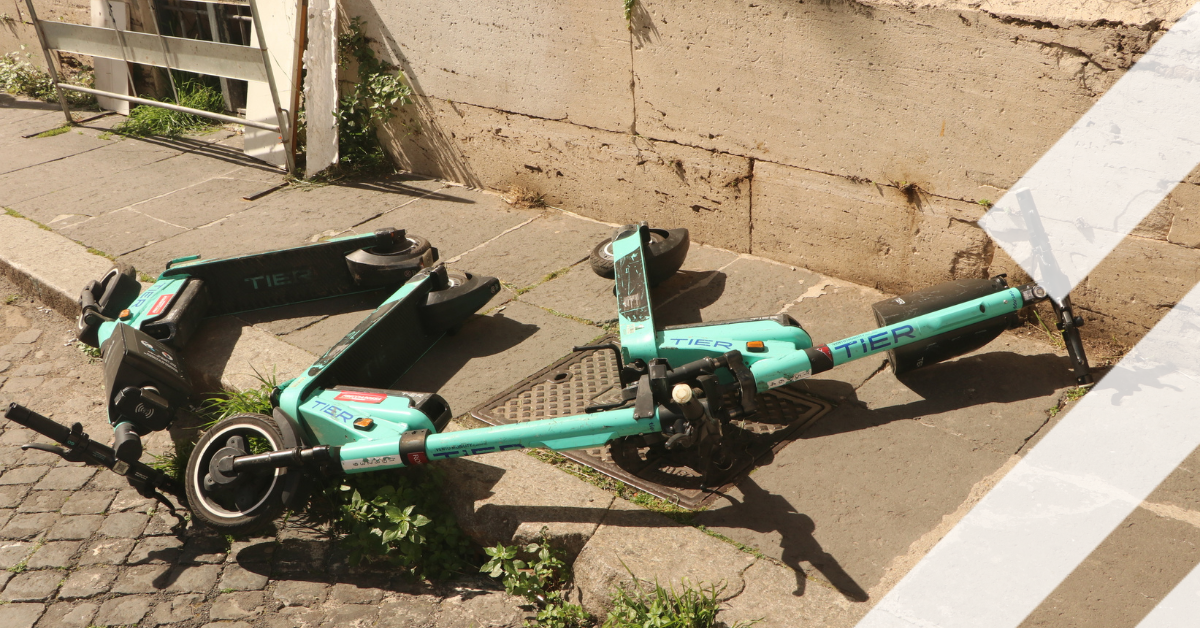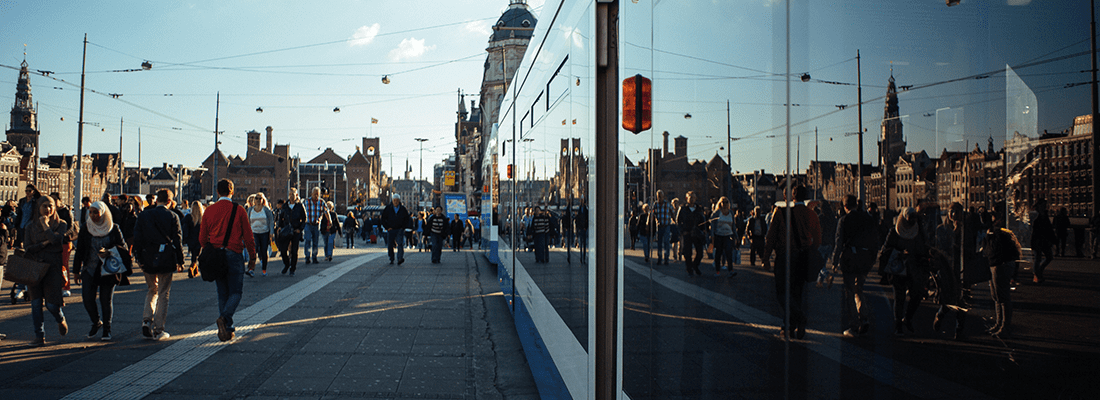Amsterdam is leading the way for Mobility as a Service in the Netherlands with successful pilots already completed in the growing Zuidas district of the city and a new app planned for 2020.
As well as being the host city of the largest of all the Intertraffic shows, Amsterdam is increasingly establishing itself as a leader in smart mobility for residents and visitors alike. Over the past few years, it has been the test bed for the experimentation of several Mobility as a Service (MaaS) projects. One of the most recent examples is a pilot known as The Zuidas Mobility Experience.
Creating car-less commuters
Based in the busy commercial district of Zuidas, a select group of workers in the area were handed €1,000 to spend on their commute for the month. They were free to travel in any way they so wished and even retain whatever was left over for themselves. First class train travel? No problem. Rent a Tesla for the weekend? Why not? Or cycle to work and keep all the money for something else… All these options and more were viable but there was, however, one significant caveat. To receive this generous gift, the senior employees were required to give up the keys to their company car for the duration of the experiment.
Part of a much broader smart mobility project, the intention was to ramp up the small-scale testing of MaaS-related services to something that can be of benefit to all Amsterdam citizens. The results of the pilot were so positive that a new MaaS app is being rolled out specifically for business users in the Zuidas district by January 2020. Initially aimed at forming a serious alternative to commuting to the area by car, the expectation is that the app will ultimately benefit a wider portion of Amsterdam citizens. Tijs Roelofs, Amsterdam’s smart mobility manager, knows this is a significant task. “The only way Amsterdammers will consider leaving the car behind is if they have a better and cheaper alternative and therefore experience ‘freedom of mobility,’” he says.
A region of the city experiencing a lot of redevelopment and investment Zuidas is ideal not only for testing but also embedding of the travel solutions of the future as it grows out. In the MaaS Zuidas pilot, governments and leading employers in and around Zuidas will work together to make a MaaS service possible.
The ultimate goal is that by 2025, the whole of Amsterdam will be a place where alternative modes of transport are viable and attractive and where shared mobility is affordable, reliable and accessible to everyone. Such solutions may even take advantage of an asset not available in many other major cities in the world – Amsterdam’s famous network of canals.
"The only way Amsterdammers will consider leaving the car behind is if they have a better and cheaper alternative"
Tijs Roelofs, smart mobility manager, Amsterdam
Software solution
One firm, Autocab, is already doing its part in bringing MaaS to the city. The firm’s software is embedded in the vehicles of Amsterdam’s largest taxi operator, Schiphol Taxi, processing over 4.4 million journeys that its drivers make shuttling individuals in and around the Dutch capital each year. And in doing so it is well placed to begin building a detailed picture
of mobility demand.
“Detailed trip data, on passenger preferences and habits, is what will enable MaaS to operate intelligently,” says Autocab CEO Safa Alakteb. “Taxi and private hire vehicles are a particularly rich resource of data in this regard – they are currently capturing vast amounts of personalized information about passenger habits and the most commonly used routes in their cloud-based booking and dispatch systems.
“Other transport operators should be able to take the information collected from these passenger bookings and use it to update wait times or improve traffic flow by better managing the number of vehicles on the roads. “These insights will form the basis of town mapping for mobility solutions of the future, helping to improve the user’s experience and keeping services running smoothly.”
Greener power
The majority of the roughly 1,000 vehicles on Schiphol Taxis books are combustion-powered but a growing proportion are electric. With 200 being Teslas, the taxi firm currently has the largest electric vehicle (EV) taxi fleet in Europe and reducing emissions from the vehicle’s tailpipe, while not integral, fits with the broader MaaS philosophy. There are, however, a number of issues to overcome for them to be considered comfortable bedfellows.
“Obtaining accurate information from EV vehicles can be challenging, as it can be affected by how well charged it is”, says Alakteb. “In the case of an EV taxi, for example, operators need to take into account the distance of travel, traffic levels and total travel time before dispatching a vehicle with sufficient battery charge to be able to fulfil a booking and then return to a charging station.
“It’s also important to consider the infrastructure of a city and whether this is able to facilitate EVs. If there are not adequate charging points, it can be difficult for the EV to provide data and operate away from a central hub.” Autocab developed a specific solution for Schipol’s EV fleet to ensure they ran more efficiently between charges. Working with Tesla to enable onboard computers in the vehicles to obtain accurate charge information – this information then fed into an algorithm, ensuring the nearest available vehicle was dispatched to fulfil the booking and also be able to return to a charging station. A login facility for the EVs was also developed so that drivers can quickly swap in and out of different vehicles at charging stations.
€1,000
The travel budget given to participants in Amsterdam’s Zuidas Mobility Experience, in return for giving up their car for a month
4.4 million
The number of journeys made by the Schiphol Taxi firm each year in Amsterdam
200
The number of Tesla electric vehicles on Schiphol Taxis’ 1,000 vehicle fleet
"One of the biggest challenges we face in implementing MaaS is the traditionally fragmented nature of the transport industry"
Safa Alakteb, CEO, Autocab
Team players
Autocab collects data from more than 1.5 million taxis around the globe on a daily basis, but as rich as the data generated is, Alakteb is well aware that to see the MaaS revolution that Amsterdam envisages Autocab can’t do it alone.
“One of the biggest challenges we face in implementing MaaS is the traditionally fragmented nature of the transport industry. Without doubt we need to encourage more transport providers to collaborate – both with each other and governments – in order to make it work.
“Partnerships will be essential so data can be shared easily, and passengers are provided with up-to-the-minute information on schedules and availability of vehicles. Creating a single platform, where both public and private operators can cooperate to meet customer demand, will help to build these important relationships.”
Seamless travel
When it comes to connecting Amsterdam’s public transport, the foundations are already in place. A chip card can currently be used by travelers for all public transport in the city – on trams, trains, the metro and buses. This is making mobility seamless for passengers, removing the frustration of having to make separate payments when switching between different forms of transport.
“If we want this new MaaS ecosystem to work for everyone, we need to think beyond the city and take into account those living in rural areas too”, argues Alakteb. “They need it more than ever as public transport services serving these communities today are often infrequent and unreliable. To achieve this, we should be turning to shared mobility solutions, such as taxis and ride-hailing, which will help to get people through the first leg of their journey. With their widespread availability, these shared solutions can serve as that important initial link before the passenger then connects to another mode of transport closer to the city, such as a train or tram.”
In many ways, the taxi industry is leading the way in bringing MaaS to the masses. Onboard software is enabling local firms to share jobs and reach customers quicker. Taking this approach, Alakteb is confident that extending it more widely would result in fewer wasted miles for the driver and minutes for the customer.
It seems inevitable that the MaaS revolution is on its way and with the roll out of the app in Zuidas as well as the efforts of government and business city-wide, there is every chance Amsterdam will lead the way. It is appropriate then that it is in the city that it is also the home of Intertraffic where the systems and services can experienced first hand.
MaaS in the Netherlands
Seven different projects are being trialed around the country
- From January 2020, an app providing MaaS services will be available for a trial period of two years with the goal of improving access to the burgeoning Zuidas district in Amsterdam.
- A similar app intending to stimulate use of alternative modes of transport to cars will also be introduced in the Dutch region of Utrecht.
- In Eindhoven, in conjunction with a number of employers based in the city, a project is already underway that aims to ensure all business travel there is done sustainably by 2025.
- The only province in the country with borders to two other nations, Limburg is addressing multimodal possibilities in a cross-border context with the intention of simplifying public transport travel and reducing car use in the process.
- Accessible travel for less able-bodied individuals is limited in Twente so special attention is being given to increasing MaaS options for customized transport.
- With poor public transport options in Groningen-Drenthe, a new two-year project intends to create affordable mobility for travellers in the region
- Traveling to Rotterdam from The Hague Airport is currently only easily done by car. A new project is seeking to develop multimodal options.
Making MaaS work
Solving the ‘first and last mile’ problem
The first and last mile can pose problems for those using transport services in larger cities such as Amsterdam. Public services can be prone to error and often struggle with capacity at peak times. These issues should be eradicated with an intelligent MaaS system, as data can be fed back into the system to keep services flowing and passengers up to date. Ultimately those on the move should be able to enjoy a connected and speedy service from the start to end point of their journey.
Transport operators should be taking inspiration from the taxi industry – for years, taxis and private hire vehicles have been a vital part of our transport network, offering customers a personalized door-to-door service.
This service has become ever more innovative too thanks to technology, with many local firms now able to offer passengers the option to book a ride using an app on their phone. As hundreds of cars operate within a single firm, taxis are also collecting huge amounts of data globally each day. They operate across cities, towns and villages so know the ins and outs of our roads. This information can then be fed back to smart city planners and OEMs as they start planning for the future.




